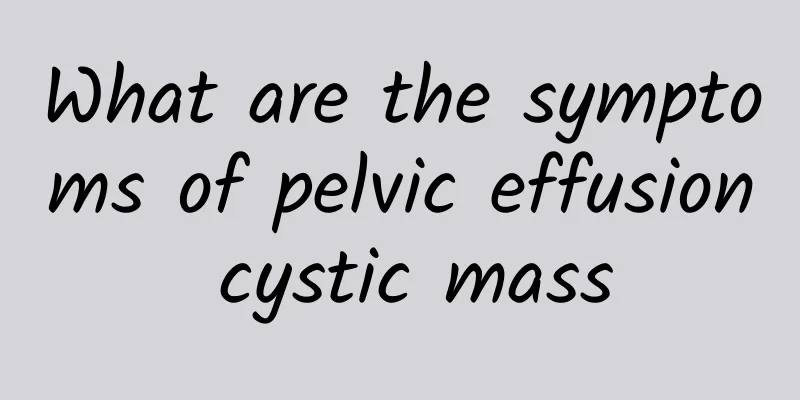What are the symptoms of pelvic effusion cystic mass

|
Symptoms of pelvic effusion and cystic masses vary depending on the severity and specific cause of the disease. Common manifestations include dull pain and tenderness in the lower abdomen, irregular vaginal bleeding, abnormal vaginal discharge, and discomfort in the lumbar region. If the symptoms are obvious or continue to worsen, it is recommended to seek medical attention immediately to determine the cause. Pelvic effusion is often caused by inflammation (such as pelvic inflammatory disease, adnexitis), and the early symptoms include a feeling of heaviness and dull pain in the lower abdomen. In severe cases, it may be accompanied by systemic symptoms such as fever and chills. Cystic masses may be caused by ovarian cysts, hydrosalpinx, etc. Many patients have no obvious symptoms for a long time and are only discovered during physical examinations. If compression is applied to surrounding organs, frequent urination, constipation, or a feeling of swelling in the lower abdomen may occur. When a cystic mass twists or ruptures, severe lower abdominal pain and nausea and vomiting are typical manifestations, which are emergencies and need to be treated as soon as possible. Some patients may have menstrual abnormalities, such as prolonged menstruation, heavy or irregular bleeding. Pelvic effusion is often caused by inflammation (such as pelvic inflammatory disease, adnexitis), and the early symptoms include a feeling of heaviness and dull pain in the lower abdomen. In severe cases, it may be accompanied by systemic symptoms such as fever and chills. Cystic masses may be caused by ovarian cysts, hydrosalpinx, etc. Many patients have no obvious symptoms for a long time and are only discovered during physical examinations. If compression is applied to surrounding organs, frequent urination, constipation, or a feeling of swelling in the lower abdomen may occur. When a cystic mass twists or ruptures, severe lower abdominal pain and nausea and vomiting are typical manifestations, which are emergencies and need to be treated as soon as possible. Some patients may have menstrual abnormalities, such as prolonged menstruation, heavy or irregular bleeding. Maintain a regular schedule, strengthen pelvic care, pay attention to hygiene, avoid spicy food and long periods of sitting to reduce the occurrence of symptoms. If you feel unwell, you should seek medical attention in time for an ultrasound examination to confirm the diagnosis. For the treatment of pelvic effusion, anti-infective drugs such as cephalosporin and metronidazole, or combined with physical therapy to improve symptoms; for cystic masses, conservative observation, medication to adjust hormone levels, or surgical removal of cysts are generally adopted, depending on the specific situation and decided by the doctor. |
<<: Can uterine cysts be prevented?
>>: What is endometriosis? Is it serious?
Recommend
What are the changes of uterine fibroids in a week? Why is uterine fibroids growing rapidly within a month?
What are the changes of uterine fibroids in a wee...
We need to know the causes of vaginitis
In recent years, the incidence of vaginitis has b...
Is it difficult to lose weight even with exercise? Zhao Hanying: Drinking water before, during and after makes a big difference
Can’t get rid of excess fat? Modern people pay at...
Is moderate cervical erosion difficult to treat? Pay attention to these matters when treating moderate cervical erosion
Many women usually have some gynecological proble...
Can uterine fibroids be cured?
The occurrence of uterine fibroids has a huge imp...
Amenorrhea caused by artificial abortion for 7 years was cured
In the second year of her marriage, Ms. Tao welco...
Pregnant women's daily diet calories are 30 kcal per kilogram
How many calories does a pregnant woman need in a...
What medicine is good for women with amenorrhea
Amenorrhea is a common manifestation of abnormal ...
Will vulvar leukoplakia develop into vulvar cancer?
Short story: Ms. Lin suffers from vulvar leukopla...
Treatment for lochia that has not been cleared 7 days after abortion
Xiao Shao, 35 years old, has a son and lives in h...
If you want to lose weight, you must eat right in the morning, lunch and evening! The "inverted triangle" eating method helps you lose weight healthily
If you want to lose weight healthily, develop an ...
Is uterine fibroid surgery safe?
Uterine fibroids are the most common benign gynec...
Hormones and cryotherapy are also treatments for vulvar leukoplakia
Normal07.8磅02falsefalsefalseMicrosoftInternetExplo...
Nursing preparation required for medical abortion
The use of drugs to terminate pregnancy is the la...
Can ovarian cysts cause back pain? What should I pay attention to after treatment?
Can ovarian cysts cause lower back pain? Generall...









